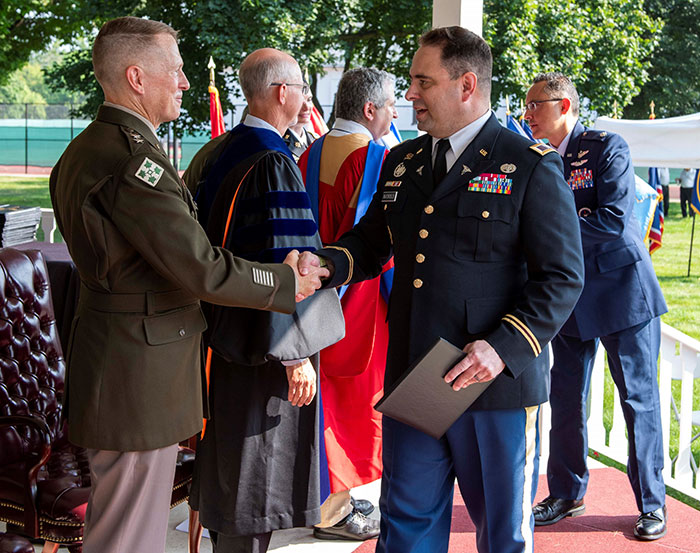MRDC War College Grads Praise Value, Impact of Education

In a nod to the growing reach and importance of the U.S. Army Medical Research and Development Command, four active-duty officers and one civilian employee from MRDC graduated from the U.S. Army War College last month following participation in a two-year long distance learning course. Selection for attendance at the Carlisle, Pennsylvania-based institution is considered a high honor, as it offers graduate-level instruction to senior military officers and civilians to prepare them for senior leadership assignments and responsibilities.
"Had you asked me a couple years ago, I'd say that I wasn't sure I was going to do it," said Col. Mara Kreishman-Deitrick, deputy commander at MRDC's Walter Reed Army Institute of Research and one of the command's four graduating officers. "Then I was selected and given the opportunity to do it, and in discussion with other MRDC senior leaders, I realized it really is a steppingstone – sort of like a tool in the toolkit – to get you to that next strategic level of leadership."
In addition to Kreishman-Deitrick, active-duty MRDC graduates included Col. John Nuckols, military deputy to the MRDC Principal Assistant for Acquisition; Col. Sharon Rosser, deputy commander at MRDC's Telemedicine and Advanced Technology Research Center; and Col. Kara Schmid, director of Medical Systems for the Office of the Deputy Assistant Secretary of the Army for Research and Technology. Bob Roussel, an MRDC civilian employee who serves as both the chief of Research Support Operations and the director of the Office of Research Quality and Compliance at MRDC's Research Institute of Environmental Medicine, was also selected for participation in the program.
War College courses are designed to put the day-to-day work performed by attendees into a broader strategic context, while also focusing on a range of critical thinking skills considered key to digesting pertinent national security issues and concepts. Combined with courses centered on the art and science of warfare, the ultimate instructional goal is to create leaders who are more balanced and strategically aware. Graduation from the War College is considered a differentiator for certain command-level opportunities.

"The War College gives you a different lens by which to analyze the data you're presented with on a daily basis and offers the opportunity to think about these things in a different way," said Nuckols, additionally noting the college's focus on interpersonal communication techniques as a tool for effective problem-solving. "It helps you think through how to more effectively communicate with senior leaders, how to get messages across in a way that really resonates with folks who may not know what we do day-to-day. It really provides that strategic context that we don't often have."
Said Rosser of being tapped to attend the institution, "As a leader and a lifelong learner, being selected was – and still is – a complete honor." With a service career that spans nearly 34 years, Rosser is quick to note the enduring impact that War College coursework can have on the larger command. "This kind of work broadens your aperture to think and look at all sides of an issue," she said. "And personally, the most important thing isn't for me to have gained that knowledge – it's really sharing these lessons with the organization, whether that be with TATRC or peers and colleagues in the larger MRDC. To have them understand everything we do at our level has a complementary second, third and fourth level impact down the line."
Following the two years of asynchronous, online learning, all graduates reported to the college's main campus for a final in-person session from July 16-28. Notably, the most recent class was the first to attend the in-person session since the novel coronavirus pandemic began in 2020. In all, a total of 355 people graduated from the War College on July 28.
"I've always wanted to be a more effective strategic thinker and leader, and the critical thinking and strategic and the historical-mindedness that you come away with after this – it's really impressive," said Kreishman-Deitrick. "It's by far the best military education experience I've ever had."
Said Nuckols of MRDC's substantial representation in the graduating class, "It speaks to Army Medicine, but more specifically it speaks to MRDC that four active-duty officers – out of a very limited number, by the way – were selected to be a part of this class. That's a standout point that represents the command at large and says that we have quality officers and people in this command."
 An official website of the United States government
An official website of the United States government
 ) or https:// means you've safely connected to the .mil website. Share sensitive information only on official, secure websites.
) or https:// means you've safely connected to the .mil website. Share sensitive information only on official, secure websites.


